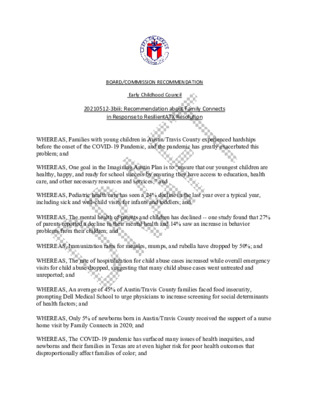Backup — original pdf
Backup

BOARD/COMMISSION RECOMMENDATION Early Childhood Council 20210512‐3biii: Recommendation about Family Connects in Response to ResilientATX Resolution WHEREAS, Families with young children in Austin/Travis County experienced hardships before the onset of the COVID-19 Pandemic, and the pandemic has greatly exacerbated this problem; and WHEREAS, One goal in the Imagining Austin Plan is to “ensure that our youngest children are healthy, happy, and ready for school success by ensuring they have access to education, health care, and other necessary resources and services;” and WHEREAS, Pediatric health care has seen a 24% decline in the last year over a typical year, including sick and well-child visits for infants and toddlers; and WHEREAS, The mental health of parents and children has declined -- one study found that 27% of parents reported a decline in their mental health and 14% saw an increase in behavior problems from their children; and WHEREAS, Immunization rates for measles, mumps, and rubella have dropped by 50%; and WHEREAS, The rate of hospitalization for child abuse cases increased while overall emergency visits for child abuse dropped, suggesting that many child abuse cases went untreated and unreported; and WHEREAS, An average of 45% of Austin/Travis County families faced food insecurity, prompting Dell Medical School to urge physicians to increase screening for social determinants of health factors; and WHEREAS, Only 5% of newborns born in Austin/Travis County received the support of a nurse home visit by Family Connects in 2020; and WHEREAS, The COVID-19 pandemic has surfaced many issues of health inequities, and newborns and their families in Texas are at even higher risk for poor health outcomes that disproportionally affect families of color; and WHEREAS, Black women are 2.3 times more likely to die from pregnancy or childbirth-related causes – Black Mamas ATX reports that this relates to the mental health effects of unrecognized bias in communication or care of Black women, in the identification and intervention of postpartum depression, and the context of the social determinants of health; and WHEREAS, 27% of Black women in Texas have not seen a doctor in the past year; and WHEREAS, Increases in food insecurity in Austin/Travis County were most significant among Hispanic and Spanish-speaking families, especially due to job loss; and WHEREAS, As of April 12, 2021, 32% of White Texans have been vaccinated for COVID-19, while only 19% of Black Texans and 21% of Hispanic Texans have been vaccinated; and WHEREAS, This decline in standard health care coupled with negative trends in social determinants of health, like food insecurity and stress, will lead to poor health outcomes for all families with newborns in Austin/Travis County, especially those in Black and Brown communities; and WHEREAS, We need to invest in and normalize a universal system of care for the postpartum period; and WHEREAS, Providing in-home nurse visitation, conducting health and environmental wellness screenings, and facilitating referrals to long-term support from a network of community resources greatly improve the chances of success for all families with newborns; and WHEREAS, Family Connects is an evidence-based, short-term, postpartum, nurse home visiting program for families with newborns; research shows that a $1 investment in the Family Connects program returns $3 in savings on emergency room costs alone; and an investment from public dollars has the potential to reach population-level results that piece-meal funding from philanthropic sources could never achieve. NOW, THEREFORE, BE IT RESOLVED that the Early Childhood Council recommends that the City of Austin expand the reach of the Family Connects program by 2,000 births per year to provide the healthiest possible start for newborns and their families in Austin/Travis County. An investment of $1.18M a year ($3.54M for 3 years) would enable the Family Connects program to add an additional 2,000 births a year with an emphasis on serving births covered by Medicaid and families served by our community’s Federally Qualified Health Centers. Date of Approval: Attest: _____________________________________________ Record of the vote: